alexjw2608
66 posts
I like Expedition 33, Persona 3/4/5, Metaphor:ReFantazio, SMTV || currently in Expedition 33 era, lost in Canvas || I love both Verso(s) and Alicia ❤🩹 || #ryomina #ryoham #souyo
Last active 2 hours ago
Don't wanna be here? Send us removal request.
Text

I think i just found out what alicia plays (its a violin/viola case on the floor)
36 notes
·
View notes
Text
Clair Obscur spoilers
Just realized that game starts with a duel between brother and sister and ends with a duel between brother and sister.
#clair obscur: expedition 33#clair obscur spoilers#expedition 33 spoilers#clair obscur expedition 33#expedition 33#coe33#clair obscure: expedition 33 spoilers
43 notes
·
View notes
Text
What a beautiful song Lost Voice💔 And its literal and metaphorical meaning for Alicia (and Maelle): when you lose loved ones it's hard to find the words. I can't help but cry every time I listen to it.
#expedition 33 spoilers#clair obscur spoilers#clair obscur: expedition 33#clair obscur expedition 33#expedition 33#alicia dessendre#maelle#Spotify
12 notes
·
View notes
Text
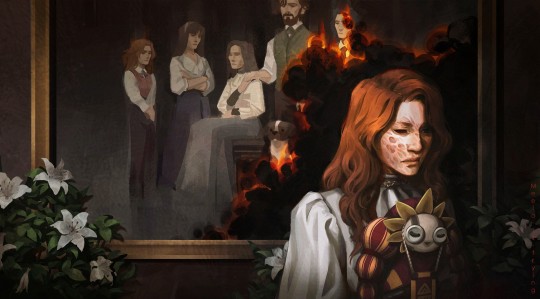
Alicia, our little shadow.
A painting for one of my favorite characters, i wonder what she was like before the fire, was she stubborn and confident like Maelle, did she share her love for writing with Renoir, did Clea try to teach her to paint in a gentler way than Aline did... I have so much empathy for her and what she's been through, there's a lot about her i can relate to.
658 notes
·
View notes
Text
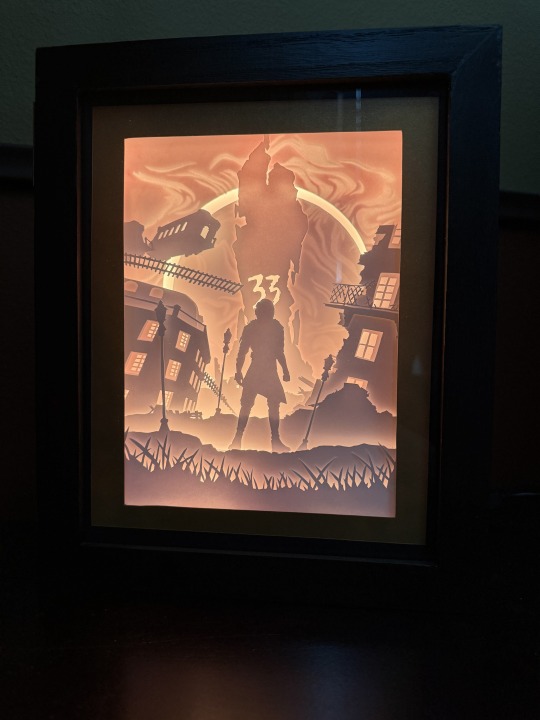
Little project for my personal GotY pick, no contest.
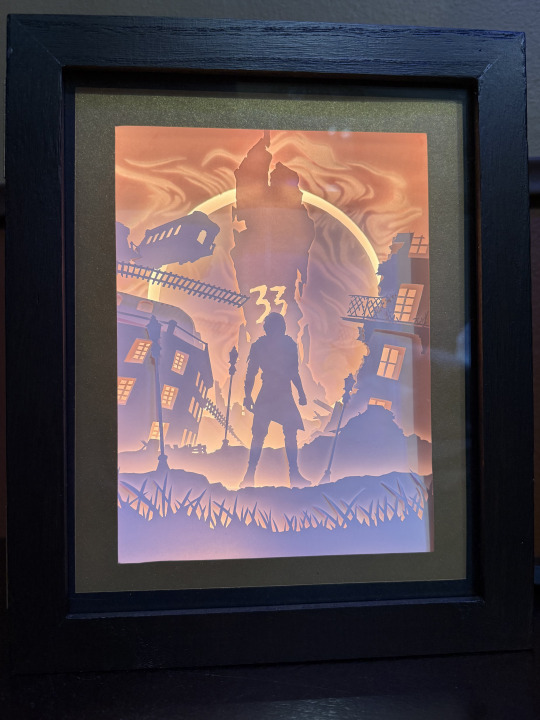
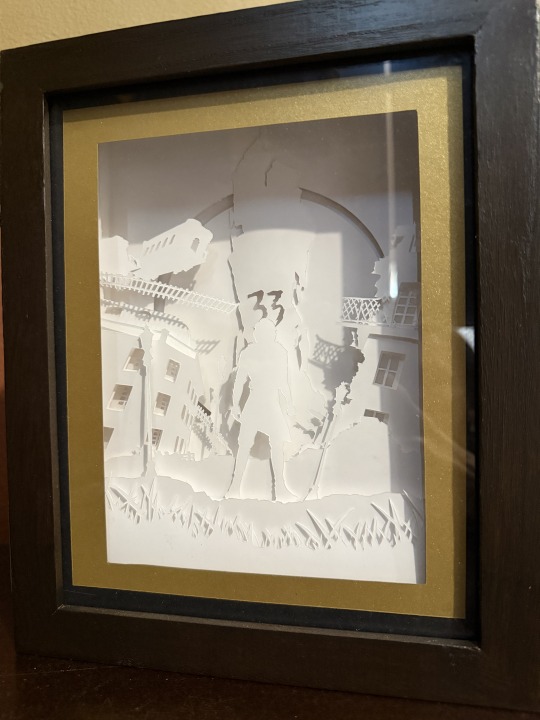
You only see the chroma waves when it's lit up :)
18 notes
·
View notes
Text
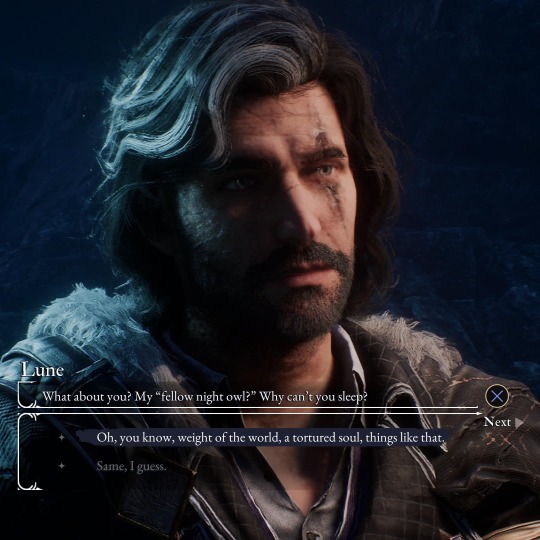
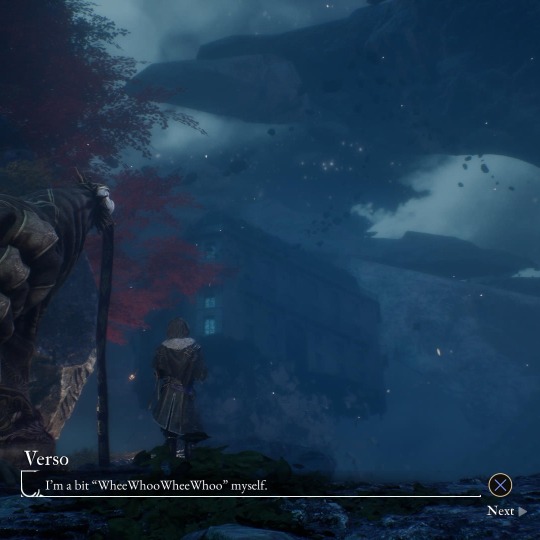
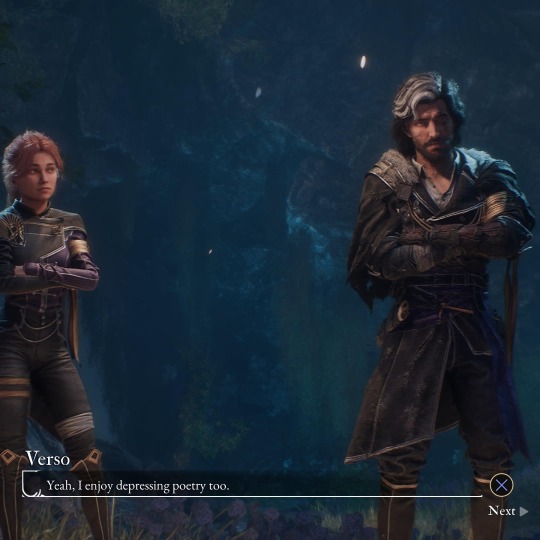
He takes being the saddest man alive surprisingly well all things considered
646 notes
·
View notes
Text
One of my favorite Verso's lines in combat is "Disaster Expedition, eh?". I'm amazed at how such a small line carries so much meaning. Guess the fact that Maelle accepted him into the team touched him more than it seemed at first glance. Verso💔💔💔
#clair obscur spoilers#expedition 33 spoilers#clair obscur expedition 33#clair obscur: expedition 33#expedition 33#verso#maelle#e33#coe33
81 notes
·
View notes
Text


Verso and Maelle | 06.11.2025 | Clair Obscur: Expedition 33
Camera by Frans Bouma. Captured using ReShade.
22 notes
·
View notes
Text
Don’t mind me, I’m just thinking how culturally and socially we are conditioned to choose Verso’s ending.
Disclaimer: This is not anti-/pro- any Ending (even if I skew a little). This is just me trying to make sense of it, outside the discourse and interpretations concerning character perspective and intrinsic motivations (Verso and Maelle), agency and its theft, micro vs macro scale of the worldbuilding, the sentience of Lumière citizens and value of art, and, letting go of the grief. In this ramble, I focus solely on the storytelling element across majorly Western cultures, our mortality system, and how this would unconsciously bias our choice.
Another disclaimer: I’m all for healthily processing grief. Sadly, I don’t see it in what was shown in either ending. I see it, however, in events that could potentially happen later in both endings.
Obvious spoilers under the cut.
Point I: the Monomyth, i.e. the Hero comes back to their world changed, once the journey is over
In countless media we see characters embark on beautiful journeys across other worlds, be in different dimensions, alternatives timelines, or fictional universes. These stories also often feature antagonists who struggle with grief and the desire to reverse loss at great cost. Such narratives almost always resolve with a “return”: the hero had their adventure, they’ve grown ("You will know love and you will know pain" Maelle's canvas mother said), and now it’s time to go back to the “real” world, the one that matters (cue the Monomyth).
However, I wonder if the above character archetype/story structure can be so easily applied to Clair Obscur due its own unique worldbuilding.
To say that Alicia (now Maelle) has "grown enough" in the Canvas, and must return to her "original world" is based on the classic reading of the Monomyth, and this view posits her as the typical heroine who is an intruder, or visitor, to a different realm and who ultimately needs to leave (she falls into Canvas as Alice falls into Rabbit Hole). But Alicia, although literally, doesn’t just fall into the Canvas—she lives two full lives within it, and thus, enters a liminal stage. She spent two different lives in two different dimensions, and her existence had two very different natures (one reborned as Maelle, a Canvas mortal, and one as Alicia, an outsider god). The classical western storytelling would argue against that liminality. The comeback to the "real" world is inevitable.
Farah Mendlesohn, in Rhetorics of Fantasy (2008), discusses "portal-quest" fantasies, that is narratives where protagonists enter magical worlds through portals but must eventually return. These stories preserve the “real” world’s dominance and often serve as allegories for growth and reintegration. If we apply that frame here, choosing Verso’s ending mimics this familiar pattern. But Clair Obscur at the same time resists that closure. The story could be not about returning, but remaining and transforming (Alicia becoming not a Paintress in the end, but a Curator; but that's for a different post).
It’s okay if anyone sees it in this way, you can feel any way you like about the game. But personally, I think of Barthes' concept of the “Death of the Author” (1977) which argues that player interpretation is shaped by cultural templates. This would explain why, most people, could be naturally drawn to Verso’s ending (for this particular reason amongst other reasons), because that’s what we are used to; firstly by the character archetype and secondly by the story structure.
Point II: Death gives meaning to life
It’s interesting how we only attach meaning to life if there is death. How life is only worth it if it ends, just like everything else. If it's not ephemeral, it's not beautiful. The finality of death is what serves for us as a warning and guiding point. We grow and change because we can die one day. This belief runs deep in Western existentialism. Heidegger argues that only through the awareness of death (Being-toward-death) can individuals live authentically (1927). Moreover, we are constantly reminded of the threat of immortality and how it strips away morality, humanity, and any meaning to our actions in a very nihilistic way.
The destruction of the canvas brings closure and finality, and, because it ends in ultimate death (in and outside the Canvas), it gives meaning to Verso’s life. And we want his life to have meaning, we want all our deaths to matter. But Verso’s life and death are also more than the ones he had outside, or inside, the Canvas.
For me, In Clair Obscur, it feels like projecting our, players’ reality, and assigning value from our mortality system, onto the game’s reality. And understandably so. But the game ‘s world offers its own systems.
Painted!Clea says "Don’t worry, death in there isn’t final. Every Canvas has its own rules. And I find death a boring outcome. Don’t you, Alicia?"
Young, original Verso gave Gestrals the reincarnation river, what they call "the gift of new beginnings" which is, ultimately (very importantly) a voluntary decision on their side. The argument I often see, is that in Maelle’s ending she robs people of mortality, as she can revive them with her godlike Painter powers, and thus, makes their life meaningless. There is no direct evidence supporting that (and as most things in both endings it relies on speculation), and moreover their new found immortality (or renewed mortality) does not have to be as binding for them as it was for Painted!Verso. Multiple lifetimes can be as beautiful and valuable as only one. For P!Verso, his painted life was not really his own and thus he found no silver lining in it (not to mention it being stained by other people's grief). Maelle-Alicia, in her second life which was her own and not bereft of agency, found purpose and inspiration (similarly to characters in Pratchett's Thief of Time (2001)).
(Bonus) Point III: narrative structures, we love parallelism
Eagleton (2003) argues that Western narratives fetishize tragedy as morally redemptive and aesthetically satisfying (Verso's continuous sacrifice which starts the story and ends the story).The Clair Obscur begins with creation of the Canvas and ends with its destruction. This mimics Genesis-to-Apocalypse narrative arcs prominent in Judeo-Christian storytelling traditions. Verso's ending offers rhythm and symmetry. (At least on the surface) it's a cleaner cut with much less space for speculation than in Maelle's ending. Her ending feels more emotionally and ethically complicated ergo narratively unfinished. Its ambiguity is more post-modern than Verso's more traditional,classical ending.
TLDR; We repeat familiar narrative patterns from (Western) storytelling culture which is built around dualism (life/death, good/evil)("You think in false dichotomies" Lune tells us and Verso), and we gravitate towards familiarity and closure they offer. We’re drawn to the hero who returns, to death as the validator of life, and to the ending that "makes sense" in our cultural logic. But what if Clair Obscur asks: what if sense-making lies elsewhere?
You choose where.
118 notes
·
View notes
Text
Something something about the sad state of Flying Manor, how many destroyed libraries and torn books there are, and how all this can be a mirror to the real inner state of Clea.
#expedition 33 spoilers#clair obscur spoilers#expedition 33#clair obscur expedition 33#clair obscur: expedition 33#clea dessendre#clea expedition 33
50 notes
·
View notes
Text
Parallels between Verso’s introduction scene, the fire scene, and Verso’s ending.

In his intro scene, Verso holds his hand out to Maelle, who just experienced Gustave’s death, “It’s okay,” he tells her.


In the manor fire scene, he holds his hand out to Alicia, “You’re ok,” he also says to comfort her.

He also says “It’s gonna be ok,” if you choose Verso’s ending, but in that scene he’s holding her as she is expelled from the painting.
It doesn’t matter what’s happening, whether Maelle/Alicia is in pain or if he’s dying, his priority is always to comfort his little sister. Painted Verso or not.
843 notes
·
View notes
Text
Look, I just KNOW that Verso made Clea teach him how to braid hair when he found out he was getting a baby sister 🥺
37 notes
·
View notes



























